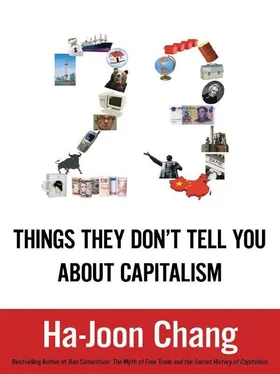Understanding technological trends is very important for correctly designing economic policies, both at the national and the international levels (and for making the right career choices at the individual level). However, our fascination with the latest, and our under-valuation of what has already become common, can, and has, led us in all sorts of wrong directions. I have made this point deliberately provocatively by pitting the humble washing machine against the internet, but my examples should have shown you that the ways in which technological forces have shaped economic and social developments under capitalism are much more complex than is usually believed.
Thing 5: Assume the worst about people and you get the worst
Adam Smith famously said: ‘It is not from the benevolence of the butcher, the brewer, or the baker that we expect our dinner, but from their regard to their own interest.’ The market beautifully harnesses the energy of selfish individuals thinking only of themselves (and, at most, their families) to produce social harmony. Communism failed because it denied this human instinct and ran the economy assuming everyone to be selfless, or at least largely altruistic. We have to assume the worst about people (that is, they only think about themselves), if we are to construct a durable economic system.
Self-interest is a most powerful trait in most human beings. However, it’s not our only drive. It is very often not even our primary motivation. Indeed, if the world were full of the self-seeking individuals found in economics textbooks, it would grind to a halt because we would be spending most of our time cheating, trying to catch the cheaters, and punishing the caught. The world works as it does only because people are not the totally self-seeking agents that free-market economics believes them to be. We need to design an economic system that, while acknowledging that people are often selfish, exploits other human motives to the full and gets the best out of people. The likelihood is that, if we assume the worst about people, we will get the worst out of them.
How (not) to run a company
In the mid 1990s, I was attending a conference in Japan on the ‘East Asian growth miracle’, organized by the World Bank. On one side of the debate were people like myself, arguing that government intervention had played a positive role in the East Asian growth story by going against market signals and protecting and subsidizing industries such as automobiles and electronics. On the other side, there were economists supporting the World Bank, who argued that government intervention had at best been an irrelevant sideshow or at worst done more harm than good in East Asia. More importantly, they added, even if it were true that the East Asian miracle owed something to government intervention, that does not mean that policies used by the East Asian countries can be recommended to other countries. Government officials who make policies are (like all of us) self-seeking agents, it was pointed out, more interested in expanding their own power and prestige rather than promoting national interests. They argued that government intervention worked in East Asia only because they had exceptionally selfless and capable bureaucrats for historical reasons (which we need not go into here). Even some of the economists who were supporting an active role for government conceded this point.
Listening to this debate, a distinguished-looking Japanese gentleman in the audience raised his hand. Introducing himself as one of the top managers of Kobe Steel, the then fourth-largest steel producer in Japan, the gentleman chided the economists for misunderstanding the nature of modern bureaucracy, be it in the government or in the private sector.
The Kobe Steel manager said (I am, of course, paraphrasing him): ‘I am sorry to say this, but you economists don’t understand how the real world works. I have a PhD in metallurgy and have been working in Kobe Steel for nearly three decades, so I know a thing or two about steel-making. However, my company is now so large and complex that even I do not understand more than half the things that are going on within it. As for the other managers – with backgrounds in accounting and marketing – they really haven’t much of a clue. Despite this, our board of directors routinely approves the majority of projects submitted by our employees, because we believe that our employees work for the good of the company. If we assumed that everyone is out to promote his own interests and questioned the motivations of our employees all the time, the company would grind to a halt, as we would spend all our time going through proposals that we really don’t understand. You simply cannot run a large bureaucratic organization, be it Kobe Steel or your government, if you assume that everyone is out for himself.’
This is merely an anecdote, but it is a powerful testimony to the limitations of standard economic theory, which assumes that self-interest is the only human motivation that counts. Let me elaborate.
Selfish butchers and bakers
Free-market economics starts from the assumption that all economic agents are selfish, as summed up in Adam Smith’s assessment of the butcher, the brewer and the baker. The beauty of the market system, they contend, is that it channels what seems to be the worst aspect of human nature – self-seeking, or greed, if you like – into something productive and socially beneficial.
Given their selfish nature, shopkeepers will try to over-charge you, workers will try their best to goof off from work, and professional managers will try to maximize their own salaries and prestige rather than profits, which go to the shareholders rather than themselves. However, the power of the market will put strict limits to, if not completely eliminate, these behaviours: shopkeepers won’t cheat you if they have a competitor around the corner; workers would not dare to slack off if they know they can be easily replaced; hired managers will not be able to fleece the shareholders if they operate in a vibrant stock market, which will ensure that managers who generate lower profits, and thus lower share prices, risk losing their jobs through takeover.
To free-market economists, public officials – politicians and government bureaucrats – pose a unique challenge in this regard. Their pursuit of self-interest cannot be restrained to any meaningful degree because they are not subject to market discipline. Politicians do face some competition from each other, but elections happen so infrequently that their disciplinary effects are limited. Consequently, there is plenty of scope for them to pursue policies that heighten their power and wealth, at the cost of national welfare. When it comes to the career bureaucrats, the scope for self-seeking is even greater. Even if their political masters, the politicians, try to make them implement policies that cater to electoral demands, they can always obfuscate and manipulate the politicians, as was so brilliantly depicted in the BBC comedy series Yes, Minister and its sequel, Yes, Prime Minister . Moreover, unlike the politicians, these career bureaucrats have high job security, if not lifetime tenure, so they can wait out their political masters by simply delaying things. This is the crux of the concerns that the World Bank economists were expressing in the meeting in Japan that I mentioned at the beginning of this Thing .
Therefore, free-market economists recommend, the portion of the economy controlled by politicians and bureaucrats should be minimized. Deregulation and privatization, in this view, are not only economically efficient but also politically sensible in that they minimize the very possibility that public officials can use the state as a vehicle to promote their own self-interests, at the cost of the general public. Some – the so-called ‘New Public Management’ school – go even further and recommend that the management of the government itself should be exposed to greater market forces: a more aggressive use of performance-related pay and short-term contracts for bureaucrats; more frequent contracting-out of government services; a more active exchange of personnel between the public and the private sectors.
Читать дальше






![Ally Carter - [Gallagher Girls 01] I'd Tell You I Love You But Then I'd Have to Kill You](/books/262179/ally-carter-gallagher-girls-01-i-d-tell-you-i-lo-thumb.webp)





